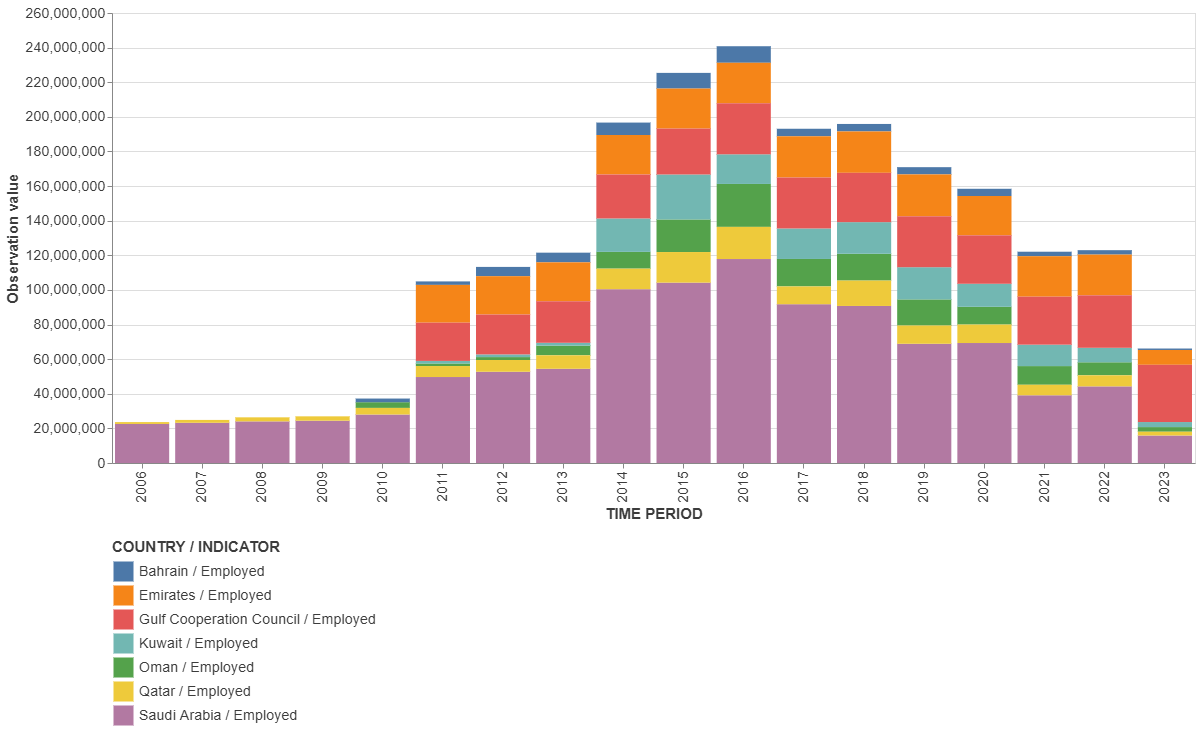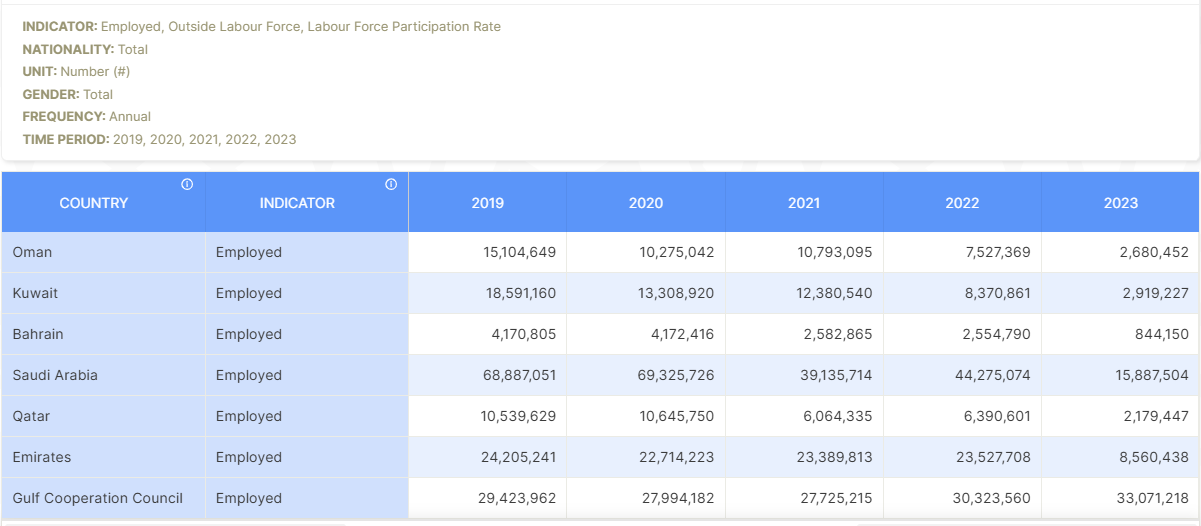
Talent mobility and employment surge across GCC public and private sectors; Here’s the data
Talent ManagementEmployment LandscapeEconomy & Policy#Trends#Outlook2025
According to the Statistical Centre for the Cooperation Council for the Arab Countries of the Gulf (GCC Stats), there has been a whopping 658.7 percent increase in jobs for GCC citizens in Saudi Arabia’s private sector since 2007. Similar employment growth trends have been noted for the UAE and Qatar, showing positive progress in workforce development across both the public and private sectors in GCC nations. In the private sector, there has been an 18.44 percent rise in employment, as the number of GCC nationals increased from 17,900 in 2007 to 21,200 in 2023. However, employment in the public sector of Gulf countries is showing mixed progress, with nearly 11,200 regional talents hired in 2023—a slight dip in the numbers compared to approximately 12,200 regional workers hired in 2007, according to the report.

The UAE's Employment Trend
According to the data, in the UAE, the public sector saw a sharp rise in GCC citizens employed, with 4,000 workers recorded in 2018—a remarkable 164.1 percent increase when compared to 2007. When analysing the nationalities of the public sector workforce, it was found that Omanis formed the biggest group with 88.4 percent, followed by Bahrainis with 7.2 percent. The remainder of the public sector workforce comprised other GCC nationals with 6.4 percent. Similarly, in the private sector, around 9,000 GCC nationals were employed in 2021, with Omanis leading at 57.8 percent, followed by Saudis at 30 percent, and other GCC nationals making up 12.2 percent.
The Kingdom of Saudi Arabia's Employment Trend
The data reveals interesting trends on cross-border employment as in Saudi Arabia, the public sector employed 13 GCC nationals in 2023, an 8.3 percent increase from 2007. Kuwaitis made up the largest group at 46.2 percent, followed by Bahrainis at 38.5 percent and others at 15.3 percent. Meanwhile, around 8,800 GCC nationals worked in KSA’s private sector in 2023, which is a staggering 658.7 percent growth compared to 2007. Bahrainis accounted for 48.8 percent, Omanis for 25.4 percent, and other GCC nationals for 25.8 percent.
Qatar's Employment Trend
In Qatar, the public sector employed around 1,100 GCC nationals in 2023, which is an 18.8 percent drop since 2007. Omanis formed the majority at 45.6 percent of the workforce, followed by Saudis at 35.6 percent and other GCC nationals at 18.8 percent. On the other hand, the private sector saw an increase of 131.2 percent, reaching 1,200 in 2023, with Saudis forming 35.2 percent of the workforce, Bahrainis 28.6 percent, and other GCC nationals 36.2 percent.
Kuwait's Employment Trend
In Kuwait, the public sector employed nearly 5,800 GCC nationals in 2023, a 38.1 percent decline from 2007. Kuwait’s workforce is dominated by Saudis at 93.5 percent, with the remainder made up of Omanis at 3.2 percent and other GCC nationals at 3.3 percent. In the private sector, only 1,500 GCC nationals were employed in 2023, which is a 90.3 percent decrease since 2007. Here too, Saudis dominated the workforce with 75.3 percent, followed by Bahrainis at 16.8 percent, Omanis at 7.3 percent, and Emiratis at only 0.6 percent.
Bahrain's Employment Trend
When analysing Bahrain’s workforce, 535 citizens from other GCC countries worked in the private sector in 2023, marking a 10.5 percent decline from 2007. Saudis formed the majority at 71.8 percent, followed by Omanis at 21.5 percent.
Oman's Employment Trend
In Oman, the public sector saw 59 GCC nationals employed in 2023, which is a 47.5 percent increase from 2007. Interestingly, Emiratis led the workforce with a 39 percent share, followed by Bahrainis at 32.2 percent, and other GCC nationals at 28.8 percent. Conversely, Oman’s private sector saw a decline, with 39 GCC nationals employed in 2023—a 24.3 percent decrease compared to 2007, when Bahrainis accounted for 53.4 percent, Saudis for 27.5 percent, and other GCC nationals for 19.1 percent.


You may also like:
- Global Weekly Updates: What’s happening around the world?
- HCM the strategic key for 2025
- 2025 Outlook: How flexibility and diversity drive economic growth
- 7 Workplace Trends for 2025 that HRs must know
Some of the key takeaways from GCC Stats’ data are:
Positive private sector employment trend: The data highlights how, over the last decade, there has been a significant increase in regional talent workforce participation in the private sectors of the UAE, Saudi Arabia, and Qatar. This reflects the governments' efforts to increase employment opportunities for Emiratis, Saudis, and Qataris, supported by nationalisation targets.
Public sector’s mixed employment trend: As nationalisation of the private sector is being pushed by the governments, there have been declines in Kuwait and Qatar’s public sectors. However, the UAE and Oman show positive growth, and Saudi Arabia has remained consistent over the last decade.
Increased talent mobility: The data provides interesting insights into cross-border talent mobility, with Saudi, Omani, and Bahraini workers dominating the workforce in other Gulf countries. In the UAE, the majority of workers in the public sector are from Oman and Bahrain. In Kuwait, Saudi nationals dominate both the public and private sector workforce.
The data shows that the GCC is focused on improving the labour market by promoting talent mobility and nationalisation of private sector, to integrate the regional workforce.









